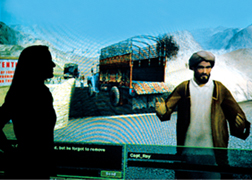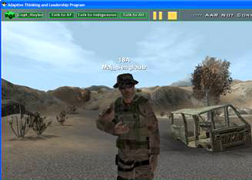NEWS RELEASES
FOR IMMEDIATE RELEASE
July 26, 2005
Sandia and U.S. Army's America's Army simulation helps Special Forces learn adaptive thinking and cultural awareness
 IN SILHOUETTE -- Elaine Raybourn is silhouetted in front of an image of the adaptive thinking simulation game she and her team developed for the U.S. Army Special Forces.
IN SILHOUETTE -- Elaine Raybourn is silhouetted in front of an image of the adaptive thinking simulation game she and her team developed for the U.S. Army Special Forces. Download 300dpi JPEG image, "americaarmy.jpg," 608K (Media are welcome to download/publish this image with related news stories.)
ALBUQUERQUE, N.M. — U.S. Special Forces soldiers are getting a unique education in adaptive thinking, negotiation, conflict resolution, and leadership within cross-cultural settings as a result of a new multiplayer computer simulation.
Developed by a team from the National Nuclear Security Administration's Sandia National Laboratories, the U.S. Army John F. Kennedy Special Warfare Center and School, and the U.S. Army's Office of Economic Manpower Analysis (OEMA) and its America's Army Government Applications team, the Adaptive Thinking and Leadership (ATL) simulation uses computer game technology to train Special Forces soldiers in critical skills.
"This Adaptive Thinking and Leadership simulation is the only simulation focused on interpersonal flexibility and strategic communication in cross-cultural settings," says Dr. Elaine Raybourn, Sandia research scientist and project lead of the Special Forces ATL simulation development effort.
"Adaptive thinking is critical for special forces soldiers as they embark on missions around the world," she says. "This simulation offers highly interactive communications exercises in learning to respect and work with other cultures. Communication skills and interpersonal adaptability are paramount in successfully achieving Special Forces objectives."
The Adaptive Thinking and Leadership simulation is designed to allow players to discover their strengths and weaknesses in mental agility, cultural awareness, interpersonal adaptability, and communication. By role-playing in a dynamically changing environment, users sharpen their ability to anticipate the consequences of different courses of action to problems that may not have a "right" answer.
 SCENE FROM Special Forces simulation game.
SCENE FROM Special Forces simulation game. Soldiers can play the simulation by themselves on a PC or with as many as 24 players on networked computers. Instructors can easily modify scenarios, monitor the play, and jump in and change the direction of the simulation at any time. Participants serve as either role-players or spectators. Their tasks vary according to their role. Spectators' tasks involve providing feedback on how well the role-players are doing during the simulation. Later, when the training is over, the instructor can lead debriefing sessions via an After Action Review (AAR) that incorporates the real-time evaluations as well as player statistics and replays of actual events.
The Special Forces turned to Sandia for help after Dr. Raybourn appeared on a National Public Radio program where she discussed decision-making in stressful environments. One Special Forces officer heard her and came to Sandia to learn more about Raybourn's research, and in particular, the focus she places on culture in decision-making. As a result, Raybourn constructed a team to develop the simulation that helps soldiers improve their skills in critical thinking, problem solving, situational awareness, understanding of novel situations, cross-cultural sense making, and communication.
The ATL simulation's highly intuitive and immersive environments were created using the America's Army game platform developed by the U.S. Army. The platform, which runs the America's Army computer game (www.americasarmy.com), is also used by the U.S. Army for developing training simulations and applications within the military and government. The Army created the America's Army Government Applications and America's Army Future Applications teams to develop simulations using the technology.
"The ATL application enables Special Forces soldiers to hone their situational awareness, negotiation skills, and adaptive capacity," says Jerry Heneghan, Executive Producer, America's Army Government Applications. "In the contemporary operating environment (COE), Special Forces operators must respond quickly and intelligently to constant change. The interactive training scenarios and after-action-review (AAR) system provide a means to evaluate the soldier's ability to identify and seize opportunities while thinking critically and creatively."
Sandia, Special Forces, OEMA, and the America's Army Government Applications team developed the simulation for the Army's Special Forces in nine months. Sandia provided the theoretical approach, innovative human performance measurements, and culturally relevant content design. Game production and networking capabilities were driven by the America's Army team and OEMA. The Special Forces John F. Kennedy Special Warfare Center and School provided subject matter expertise.
"Developing a simulation game is truly a collaborative effort requiring many talents," Dr. Raybourn says. "Sandia's expertise in training, simulation experience design, and intercultural communication, combined with Special Forces' expert insights and the America's Army team's ability to produce effective and engaging virtual learning resulted in the ideal training tool."
Special Forces began training with the simulation earlier this year, and reactions to its approach have been very positive. Soldiers have commented on Sandia's novel AAR approach of providing instructional and peer evaluation in real time during which players get feedback immediately on a number of topics, including cultural errors they may have committed. Sandia is now evaluating the simulation's use in the classroom, adding enhancements, and expanding it into different training areas, such as humanitarian assistance.
Sandia is a multiprogram laboratory operated by Sandia Corporation, a Lockheed Martin company, for the U.S. Department of Energy's National Nuclear Security Administration. Sandia has major R& D responsibilities in national security, energy and environmental technologies, and economic competitiveness.
Sandia media contact: Chris Burroughs, coburro@sandia.gov, (505) 844-0948
Sandia technical contact : Elaine Raybourn, emraybo@sandia.gov, (505) 844-7975